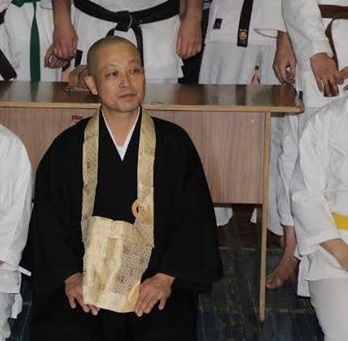The sixth master Hui-neng 六祖慧能

“The sixth master Hui-neng“
Correctly, Hui-neng is called Dajian Hui-neng Daishi (683-713) as a posthumous name. He was born in Guangzhou and he was the sixth successor from Bodhidharma. So, he was called the sixth master. When he was only three years old, his father was died. He lived in extreme poverty with his mother, which was likely cut firewood at the hill and sell them at the market.
One day at his twenty four years old, Hui-neng listened to one customer chanting Vajra sutra (the diamond pannya sutra) at the market. At that time, he felt something special to one passage of the sutra and asked the customer.
‘Where do you learn the sutra?’
The customer answered.
‘I took lessons from Zen master Khonin at Tozenin. Hundreds of monks and ordinary people gather to take lessons. Why don't you take it with us?’
Hui-neng said to him.
‘I cannot go to study because I should take care of my elderly mother.’
The customer said.
‘In that case, I will give you thirty silver to care for your mother.’
Hui-neng was surprised and answered.
‘I can’t come immediately, but I will ask someone to nurse my mother and will come back to see you.’
Later, Hui-neng had a chance to listen to the lecture of Nirvana sutra by a nun and began to study from Zen master Khonin. However it was not as a disciple. It was a training in kitchen work such as grinding flour and serving meals to seniors. He was small and powerless so he tried hard to grind flour on the mortar.
Eight months later, Zen master Khonin said to the disciples.
“I'm going to choose my successor, so everyone should submit your poem. I will decide the successor by whose poem is best.”
Hui-neng could not write and read characters, so he asked his colleague to write his poem, and submitted it to the master. The master approved Hui-neng's enlightenment as soon as he read the poem and gave him a Buddhist robe and a wooden bowl as a token of the successor. And the master said to him.
‘Leave here and go south. You should lie low for a time. In the near future you can go out into the world and spread Buddha’s dharma.’
Hui-neng left the temple during the night secretly, and was hiding in a fisherman's house. Four years later, he entered the Buddhist priesthood and became a formal priest. Then he became the chief priest of Cáoxī bǎo lín sì (曹渓寳林寺) and archived the great work as a Zen master.
土曜坐禅会(6:30~8:00)
●坐禅会 毎週土曜日午前6:25~8:00 久留米市宮の陣町大杜1577-1圓通寺
初心者歓迎 参加費無料 詳細は電話でお問い合わせください。℡0942-34-0350
●学校やクラブなど団体研修 坐禅申し込み随時うけたまわります。
費用はご希望に応じます。宿泊はありません。出張講座もいたします。

“The sixth master Hui-neng“
Correctly, Hui-neng is called Dajian Hui-neng Daishi (683-713) as a posthumous name. He was born in Guangzhou and he was the sixth successor from Bodhidharma. So, he was called the sixth master. When he was only three years old, his father was died. He lived in extreme poverty with his mother, which was likely cut firewood at the hill and sell them at the market.
One day at his twenty four years old, Hui-neng listened to one customer chanting Vajra sutra (the diamond pannya sutra) at the market. At that time, he felt something special to one passage of the sutra and asked the customer.
‘Where do you learn the sutra?’
The customer answered.
‘I took lessons from Zen master Khonin at Tozenin. Hundreds of monks and ordinary people gather to take lessons. Why don't you take it with us?’
Hui-neng said to him.
‘I cannot go to study because I should take care of my elderly mother.’
The customer said.
‘In that case, I will give you thirty silver to care for your mother.’
Hui-neng was surprised and answered.
‘I can’t come immediately, but I will ask someone to nurse my mother and will come back to see you.’
Later, Hui-neng had a chance to listen to the lecture of Nirvana sutra by a nun and began to study from Zen master Khonin. However it was not as a disciple. It was a training in kitchen work such as grinding flour and serving meals to seniors. He was small and powerless so he tried hard to grind flour on the mortar.
Eight months later, Zen master Khonin said to the disciples.
“I'm going to choose my successor, so everyone should submit your poem. I will decide the successor by whose poem is best.”
Hui-neng could not write and read characters, so he asked his colleague to write his poem, and submitted it to the master. The master approved Hui-neng's enlightenment as soon as he read the poem and gave him a Buddhist robe and a wooden bowl as a token of the successor. And the master said to him.
‘Leave here and go south. You should lie low for a time. In the near future you can go out into the world and spread Buddha’s dharma.’
Hui-neng left the temple during the night secretly, and was hiding in a fisherman's house. Four years later, he entered the Buddhist priesthood and became a formal priest. Then he became the chief priest of Cáoxī bǎo lín sì (曹渓寳林寺) and archived the great work as a Zen master.
土曜坐禅会(6:30~8:00)
●坐禅会 毎週土曜日午前6:25~8:00 久留米市宮の陣町大杜1577-1圓通寺
初心者歓迎 参加費無料 詳細は電話でお問い合わせください。℡0942-34-0350
●学校やクラブなど団体研修 坐禅申し込み随時うけたまわります。
費用はご希望に応じます。宿泊はありません。出張講座もいたします。


















